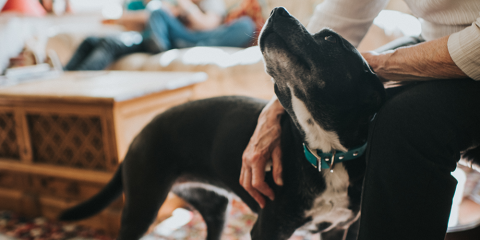 People continue to ask and I am repeating the info as not everyone sees everything posted. Dr. Gail Golab of the American Veterinary Medical Association in conjunction with the CDC answer your most common questions regarding pets and COVID-19
People continue to ask and I am repeating the info as not everyone sees everything posted. Dr. Gail Golab of the American Veterinary Medical Association in conjunction with the CDC answer your most common questions regarding pets and COVID-19
On my Steve Dale’s Pet World Listen HERE as Dr. Gail Golab, Chief Veterinary Officer, Scientific Affairs and Public Policy at the American Veterinary Medical Association explains what we do know and what we still may not be sure of regarding COVID-19 (SARS-CoV-2) and companion animals.
Veterinarians deal with corona viruses a lot and have for a very long time, canine and feline corona viruses – which the two species don’t share with one another or share with people. Also, when we get the common cold it’s usually a human corona virus (not to be confused with the novel corona virus which is now impacting the entire planet) and dogs and cats have never gotten colds from humans. But as Dr. Golab notes, this virus is different, and it’s novel; we’re still learning about it.
There was a dog tested for the COVID-19 virus in Hong Kong, owned by someone who was suffering from COVID-19. The dog does have a low level of infection. But the dog has not become ill, and has not been able to spread the virus to other dogs or to people. (Important to note: any animal may carry and infection does not equate with infectious). Still, the AVMA and particularly local veterinarians will continue to follow this one Pomeranian in Hong Kong.
IDEXX Laboratories, Inc. announced that the company has tested thousands of dogs and cats for the SARS-CoV-2 virus (COVID-19), and thus-far not a single positive test. These new test results align with the current expert understanding that COVID-19 is primarily transmitted person-to-person, and is now considered a human corona virus.
IDEXX press release:
IDEXX Laboratories, Inc. (NASDAQ: IDXX), a global leader in veterinary diagnostics and software, today announced that the company has seen no positive results in pets to date of SARS-CoV-2, the coronavirus strain responsible for the coronavirus disease 2019 (COVID-19) respiratory outbreak in humans. IDEXX evaluated thousands of canine and feline specimens during validation of a new veterinary test system for the COVID-19 virus. The specimens used for test development and validation were obtained from specimens submitted to IDEXX Reference Laboratories for PCR testing.
These new test results align with the current expert understanding that COVID-19 is primarily transmitted person-to-person and supports the recommendation against testing pets for the COVID-19 virus. For dogs or cats presenting with respiratory signs, the recommendation is to contact a veterinarian to test for more common respiratory pathogens.
“Should leading health authorities determine it is clinically relevant to test pets for the COVID-19 virus, IDEXX will be ready to make the IDEXX SARS-CoV-2 (COVID-19) RealPCR™ Test available,” said Jay Mazelsky, President and Chief Executive Officer of IDEXX Laboratories. “Pets are important members of our family, and we want to keep them healthy and safe. We will continue to monitor COVID-19 and pet health across our global IDEXX Reference Laboratories network as this situation evolves.”
IDEXX Reference Laboratories is a global network of more than 80 laboratories united by a shared commitment to advancing pet care. IDEXX never stops looking for new ways to do more and discover more to enhance the health and well-being of pets, people, and livestock. Customers worldwide benefit from the company’s sophisticated network of veterinary reference laboratories in the United States, Canada, Australia, New Zealand, Japan, South Korea, South Africa, Brazil, and across Europe, which offer the most complete and advanced menu of tests in the industry.
Still, Dr. Golab says use common sense regarding interactions with dogs and cats. It makes sense to wash hands after handling any animal. If you are a positive for COVID-19, it probably makes sense to have someone else in the home care for the animal (if possible).
Dr. Golab agrees with that in this time of great stress, hearing cats purr in our ears and taking walks with our dogs can help us to feel warm and fuzzier.
The American Veterinary Medical Association has stayed on top on this fluid situation, and is arguably the most reliable resource. The AVMA and CDC do communicate with another. So many blogs and social media may be spreading misinformation – Dr. Golab and the AVMA are arguably the most trusted in this time of confusion and fear.
COVID-19 Spread on Surfaces, such as Pets?
Q: Can pets serve as fomites in the spread of COVID-19?
A: Dr. Golab answers, “COVID-19 is usually primarily transmitted when there is contact with an infected person’s bodily secretions, such as saliva or mucus droplets in a cough or sneeze.
COVID-19 might be able to be transmitted by touching a contaminated surface or object (i.e., a fomite) and then touching the mouth, nose, or possibly eyes, but this appears to be a secondary route. Smooth (non-porous) surfaces (e.g., countertops, door knobs) transmit viruses better than porous materials (e.g., paper money, pet fur), because porous, and especially fibrous, materials absorb and trap the pathogen (virus), making it harder to contract through simple touch.
Because your pet’s hair is porous and also fibrous, it is very unlikely that you would contract COVID-19 by petting or playing with your pet. However, because animals can spread other diseases to people and people can also spread diseases to animals, it’s always a good idea to wash your hands before and after interacting with animals; ensure your pet is kept well-groomed; and regularly clean your pet’s food and water bowls, bedding material, and toys.”
The American Veterinary Medical Association is the go-to resource regarding COVID-19 and pets.
